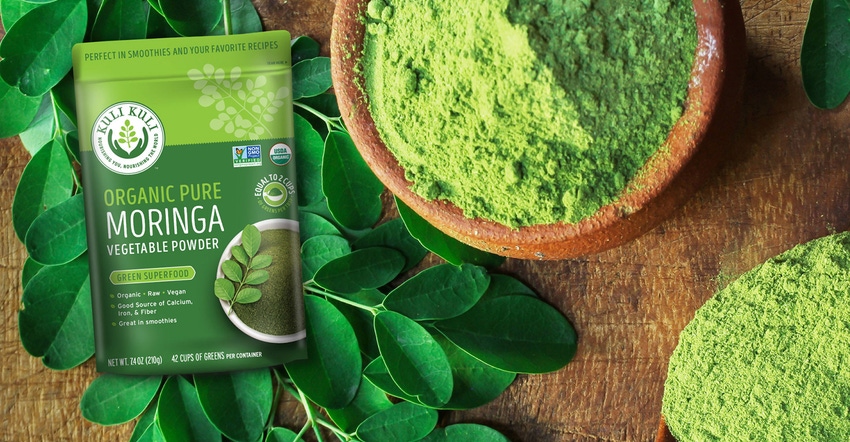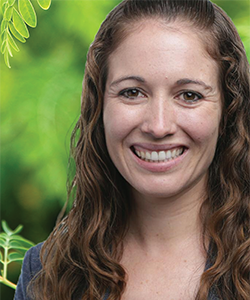March 5, 2020

As a Peace Corps volunteer, Lisa Curtis loved working at a community clinic in a rural village in Niger. But a steady diet of rice and millet left the young vegetarian feeling sluggish.
One day, she asked local women what she could eat to gain some energy, and they gave her leaves plucked from a nearby moringa tree. Almost immediately, she began to feel better and regain strength.
Turns out, moringa— a superfood that typically grows in Asia, Africa and Latin America—is loaded with iron, calcium, protein, vitamins and antioxidants. It packs twice the nutritional value of kale pound per pound and gives the body a gentle, noncaffeinated energy boost.
At 22, Curtis set out to create a market for moringa in the United States. Her mission: Bring attention to the plant’s healing properties while simultaneously creating business opportunities for local villagers. Ten years later, moringa is a top wellness trend and her company, Kuli Kuli, sells its products—powders, energy bars, shots and tea—in 11,000 stores nationwide.
We talked with Curtis about her foray into the food world, moringa farming and how Kuli Kuli tells its brand story.
How do you source Kuli Kuli moringa?
We source from 2,400 farmers in 11 countries, primarily African women. Generally, they are structured as family farms, cooperatives or social enterprises. We provide training to help our partners improve the quality of moringa they are producing, scale up the quantity and get moringa into local schools.
The cool thing about moringa is it’s a fast-growing tree: You plant it, it shoots up like a weed, you harvest the leaves and they grow back quickly. For most of our farmers, moringa is by far the most valuable crop that they grow.
What was the first account that you landed?
Whole Foods in 2014—it remains the best sales meeting I’ve ever had. We were doing consumer research at farmers markets and a Whole Foods team member suggested a meeting with a regional buyer. Our team spent all night prepping hand-made moringa bars and we were so nervous. At the meeting, the buyer immediately said, “I love moringa! Let’s bring in some products.” It was over in five minutes.

We just launched in 2,500 Walmart stores last year. For mass, there is a surprising demographic of people who eat moringa. Lots of folks in the Latino community are familiar with it, as well as those with African heritage. It’s been fun to hear people say things like, “I grew up eating this,” or “My grandmother had a moringa tree in her backyard.” Within that mass space, people often gravitate toward the powders because it’s something easy they can add to their smoothies.
In natural, people are more interested in learning about the product and hearing the brand story. They like the idea of women-owned businesses and doing good in the world. In e-commerce, you can both tell the story behind the product and also showcase different recipe ideas.
How do you share your story on package?
We lead with what the product actually is, because many Americans are not familiar with moringa. It’s a complete plant protein packed with calcium, fiber, iron, protein and antioxidants.
How do you educate consumers about your mission at shelf?
We do a ton of demos, especially in the natural channel. Being able to get in front of customers and tell the full story helps a lot. We do about 400 demos a year; it’s a big part of what you have to do when you are a new brand.
In conventional stores like Walmart, we do a lot more app-based education like digital coupons and promotional discounts.
How did you assemble Kuli Kuli’s leadership team?
We have several RPCVs (Return Peace Corps Volunteers), and some people found us. We have an interesting mix: People like me who are newer to the food industry but are smart, talented, and willing to work hard; and then we have people who have been in the industry for 20 years and want to use their skill set for something they believe in.
Do you have any mentors?
Yes, and they’ve been critical to my success. I came in knowing nothing about the food industry, but people like Chris Mann of Guayaki and Janie Hoffman of Mamma Chia have opened up their hearts and minds and given me advice.
Now, I formally advise a couple of companies and I also started a CEO founder’s group. I think it’s important to help more sustainable natural food brands come into this world. It's what we need for our health and our planet.
What has surprised you most about operating in the natural products industry?
How much a lot of the small independent retailers really get what we are trying to do. Good Earth Natural Foods is one of my favorite examples of this: They heard about our story, then decided to do a bigger feature in their newsletters and at shelf. These kinds of partnerships are very exciting to us; they get to tell their members about a cool brand with a social mission in addition to being seen as an industry pioneer.
What else should retailers know about Kuli Kuli?
Moringa is an amazing superfood that can benefit your customers. It has everything the body needs to feel good and provides natural energy. However, not all moringa is created equal. There have been some issues with heavy metals from farms located near industrial areas, particularly in India. Retailers should make sure the moringa they sell is grown in a sustainable way.
Moringa has been recognized as one of the top wellness trends and Kuli Kuli has the majority of the market so far. The most important part of it for me is staying true to why I started the company: to improve the lives of women in West Africa and beyond.
About the Author(s)
You May Also Like
.png?width=700&auto=webp&quality=80&disable=upscale)


